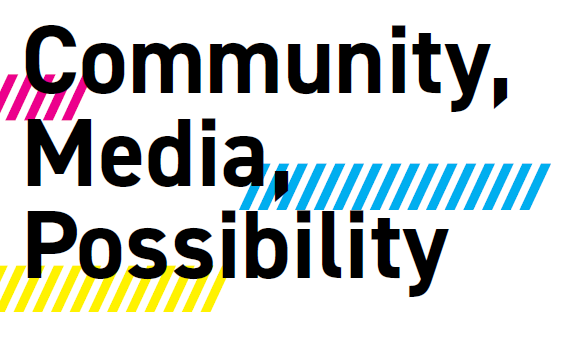
The Forum's Community | Media | Possibility programming explored the roles, responsibilities, and relationships between media and community.

The Forum's Community | Media | Possibility programming explored the roles, responsibilities, and relationships between media and community.
by Jessie Young-Roberston and Bob Bolton
This essay was written as part of the Forum's Community | Media | Possibility programming, which explored the roles, responsibilities, and relationships between media and community
Winter 2021-22, FORUM Magazine
ALASKA VOICES is a story-sharing project that started in 2017 as a platform to improve science communication using the model from StoryCorps—a national non-profit whose mission is to preserve and share humanity’s stories in order to build connections between people and create a more just and compassionate world. The episodes are 40-minute recorded conversations between two people who know each other on a topic of their choosing. As part of a one-year partnership between Alaska Voices and StoryCorps, 12 individuals, representing different fields of expertise and communities throughout Alaska, were trained as facilitators using the StoryCorps model.
Instead of just focusing on science communication, Alaska Voices expanded to a more community-based approach with conversations between scientists, community members, mentors and mentees, friends, family members, and policymakers. Special intention was given to including Alaska Native peoples in this project. Topics range from relationships to the environment to culture (science and society). To date, nearly 60 conversations have been recorded. Using a collaborative and culturally sensitive editing approach between producer Kelsey Skonberg and the participants, many of these stories have been edited into 5-8 minute pieces shared on various platforms including website, podcast, and local public radio (KUAC).
While each facilitator brought their own perspectives and reasons for joining the Alaska Voices project, the idea of “building bridges to community” was—and continues to be—the primary goal of Alaska Voices. While our world seems to be in a state of extreme polarization, we are still fundamentally human. By providing an intentional space of uninterrupted communication, the conversations that are part of Alaska Voices reveal our humanity and shared values and beliefs.
Scientists must find a line between sharing the punchline and leaving caveats on the cutting room floor.
As a thread across the science-focused topics, humanizing science and scientists has been an important part of Alaska Voices. Sometimes scientists are condensed into a single story (see Chimamanda Ngozi Adichie’s TedTalk, “The Danger of the Single Story”). The single story has been shaped by the public’s perception that science is an “ivory tower” endeavor conducted by “elitist” scientists who may appear unwilling to share findings in a streamlined and digestible format for all to consume. Honestly, the public’s perception is not entirely wrong.
Scientists are trained to communicate with other scientists, and communicating information with non-scientists is often left to the communication experts, if this communication takes place at all. As a science culture, we are trained to be objective and not give away the punchline too quickly (certainly not without enough detail to cover the caveats). We fear that the devil in the unmentioned details could damage our careers and the punchline of our work may end up being misconstrued or distorted, which is why talking to reporters about our research can be uncomfortable. However, this aspect of the science culture is one of the things that has led to the mistrust of the science community and our findings. The danger of this has become clear during the COVID pandemic. Scientists must find a line between sharing the punchline and leaving caveats on the cutting room floor. Often forgotten and/or not realized is the fact that the advancement of both science and knowledge is a continuous work in progress. The story of the process is important but seldom heard.
Alaska Voices felt that humanizing science and scientists could occur via members of the science community sharing conversations that reveal our shared humanity, including the process of conducting scientific research. The stories show that, at our core, we want what everyone wants—to be successful at things we try; have fun, be creative, and learn something new; develop meaningful relationships; and contribute to something beyond ourselves. In particular, some of our stories reveal that research is rife with failure that scientists must overcome by pivoting toward opportunity rather than focusing on what didn’t work. We put our whole selves into our research, working overtime to get our products as close to perfect as possible. Getting it wrong isn’t an option. On top of it all, we experience many of the same life challenges that everyone else experiences. Human connection comes in the shared experiences of the troughs and the peaks of life’s ups and downs, and experiences are shared through storytelling and conversation.
Scientists do not get into this line of work to get rich; we do this work because we want to make the world a better place. Some scientific contributions are big and some are small and may appear to be irrelevant in the public’s eyes, but every discovery builds upon the last one as we work toward solving a problem that plagues society. Competition and collaboration is the push-pull dynamic within the science culture. We at Alaska Voices hope listeners will connect with the stories of failure and success, the funny and the sad, and the ups and downs that make up a life. ■
The Alaska Humanities Forum is a non-profit, non-partisan organization that designs and facilitates experiences to bridge distance and difference – programming that shares and preserves the stories of people and places across our vast state, and explores what it means to be Alaskan.
November 13, 2025 • MoHagani Magnetek & Polly Carr
November 12, 2025 • Becky Strub
November 10, 2025 • Jim LaBelle, Sr. & Amanda Dale